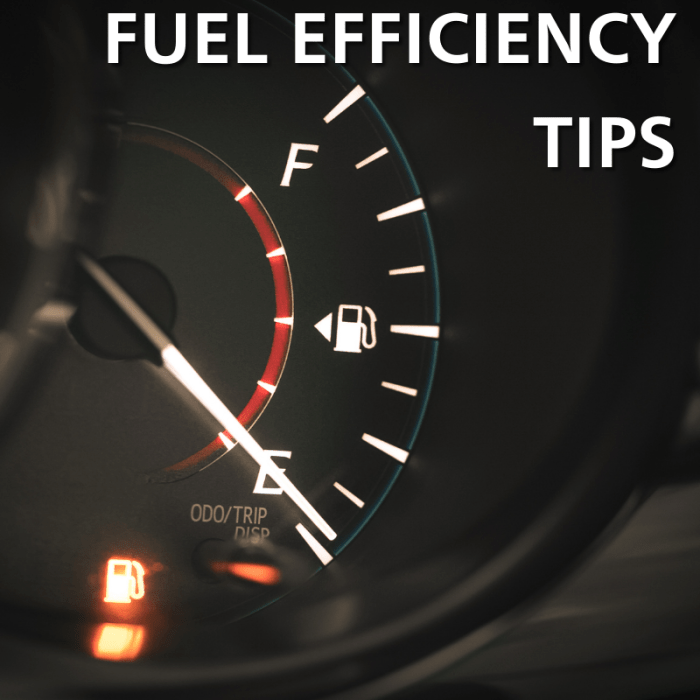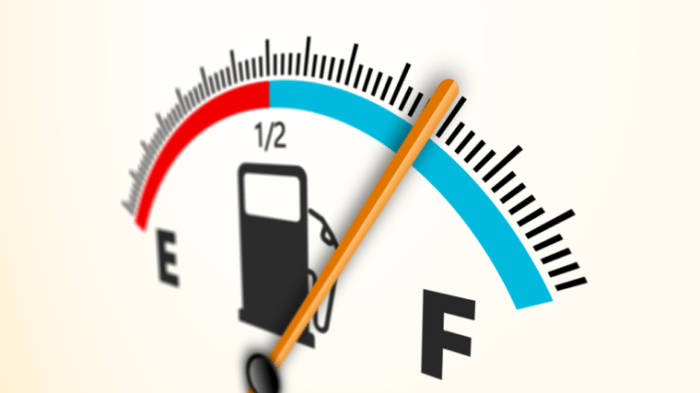Fuel efficiency tips are essential for optimizing your vehicle’s performance and saving money on gas. From driving habits to vehicle maintenance, these tips will help you make the most out of every drop of fuel. Get ready to revolutionize your driving experience with these practical suggestions.
Are you tired of spending a fortune on gas? With the right knowledge and habits, you can enhance your fuel efficiency and reduce your environmental impact. Dive into the world of fuel efficiency with these expert tips.
Importance of Fuel Efficiency: Fuel Efficiency Tips
Fuel efficiency is crucial for vehicles as it directly impacts both the environment and the economy. By improving fuel efficiency, drivers and businesses can not only save money on fuel costs but also reduce their carbon footprint.
Impact on the Environment
Improving fuel efficiency in vehicles can significantly reduce harmful emissions that contribute to air pollution and climate change. By burning less fuel, vehicles release fewer greenhouse gases into the atmosphere, helping to mitigate the effects of global warming.
Benefits for Drivers and Businesses
- Drivers can save money on fuel costs by driving more fuel-efficient vehicles. This can lead to significant savings over time, especially for those who drive long distances regularly.
- Businesses that operate fleets of vehicles can also benefit from improved fuel efficiency. By investing in fuel-efficient vehicles or implementing fuel-saving practices, companies can lower their operating expenses and increase their bottom line.
Significance of Fuel Efficiency
According to the U.S. Department of Energy, improving fuel efficiency by just 1 mile per gallon in all vehicles on the road would save approximately 1.4 million barrels of oil per day. This demonstrates the significant impact that small improvements in fuel efficiency can have on reducing oil consumption and greenhouse gas emissions.
Driving Habits for Better Fuel Efficiency
Driving habits play a crucial role in determining your vehicle’s fuel efficiency. By adopting certain practices, you can optimize fuel consumption and save money in the long run. Here are some key tips to help you drive more efficiently:
Driving at a Steady Speed
Maintaining a consistent speed while driving can significantly improve fuel efficiency. Sudden acceleration and braking lead to increased fuel consumption as your engine works harder to adjust to changing speeds. By driving at a steady pace, you can reduce the strain on your engine and maximize fuel efficiency.
Impact of Aggressive Driving
Aggressive driving behaviors such as rapid acceleration, speeding, and abrupt stops can have a detrimental effect on fuel consumption. These actions not only waste fuel but also increase wear and tear on your vehicle. By driving more calmly and avoiding aggressive maneuvers, you can save fuel and prolong the lifespan of your car.
Avoiding Idling
Idling your vehicle for extended periods consumes fuel unnecessarily. Whether you’re waiting in traffic or parked, turning off your engine can help conserve fuel and reduce emissions. By minimizing idle time, you can improve fuel efficiency and contribute to a cleaner environment.
Efficient Route Planning
Planning your routes in advance can help you save fuel by avoiding unnecessary detours and traffic congestion. Opting for shorter or less congested routes can reduce the time spent on the road, leading to lower fuel consumption. Additionally, combining errands into a single trip can further enhance fuel efficiency and reduce overall driving costs.
Vehicle Maintenance for Fuel Efficiency

Proper vehicle maintenance plays a crucial role in ensuring optimal fuel efficiency. By addressing key areas such as tire pressure, engine tune-ups, air filters, and vehicle weight, you can maximize your vehicle’s fuel economy.
Maintaining Proper Tire Pressure
- Regularly check and maintain the recommended tire pressure for your vehicle.
- Under-inflated tires can increase rolling resistance, leading to decreased fuel efficiency.
- Proper tire pressure not only improves fuel economy but also enhances overall safety and handling.
Regular Engine Tune-Ups
- Schedule routine engine tune-ups to keep your vehicle running efficiently.
- A well-tuned engine can improve fuel efficiency by ensuring proper combustion and performance.
- Addressing issues such as spark plug replacement and fuel system cleaning can positively impact fuel economy.
Clean Air Filters for Improved Fuel Economy
- Regularly replace dirty or clogged air filters to maintain optimal airflow to the engine.
- Clean air filters can lead to better combustion, resulting in improved fuel efficiency.
- Dirty air filters can restrict airflow and cause the engine to work harder, consuming more fuel.
Maintaining Vehicle Weight for Fuel Efficiency
- Remove unnecessary items from your vehicle to reduce excess weight.
- Excess weight can increase fuel consumption as the engine works harder to move the vehicle.
- Optimizing your vehicle’s weight can lead to significant fuel savings over time.
Technology and Innovations for Fuel Efficiency

In today’s automotive industry, various technological advancements and innovations are playing a crucial role in enhancing fuel efficiency. Let’s delve into some key areas where technology is making a difference.
Hybrid and Electric Vehicles
Hybrid and electric vehicles have revolutionized the way we think about fuel efficiency. By combining traditional internal combustion engines with electric motors, these vehicles can significantly reduce fuel consumption and emissions. Electric vehicles, in particular, run solely on electric power, eliminating the need for gasoline altogether. This shift towards electrification is a major step towards a greener and more fuel-efficient future.
Aerodynamic Designs
The design of a vehicle plays a crucial role in its fuel efficiency. Aerodynamic designs, such as sleek body shapes and smooth contours, help reduce drag and improve overall efficiency. By minimizing air resistance, vehicles can travel more smoothly through the air, requiring less fuel to maintain speed. Manufacturers are constantly exploring new ways to enhance aerodynamics and optimize fuel efficiency in their vehicles.
Engine Technologies
Advancements in engine technologies have led to significant improvements in fuel efficiency. Technologies such as direct injection, turbocharging, and variable valve timing help engines operate more efficiently, maximizing power output while minimizing fuel consumption. By optimizing the combustion process, these technologies ensure that fuel is utilized more effectively, resulting in better fuel economy for drivers.
Smart Technologies for Monitoring Fuel Usage, Fuel efficiency tips
Smart technologies are becoming increasingly common in modern vehicles, offering drivers valuable insights into their fuel usage. Features like real-time fuel economy displays, eco-driving feedback, and predictive maintenance alerts help drivers make more informed decisions to maximize fuel efficiency. By monitoring fuel usage and driving habits, drivers can adjust their behavior to achieve optimal fuel economy and reduce overall fuel costs.

